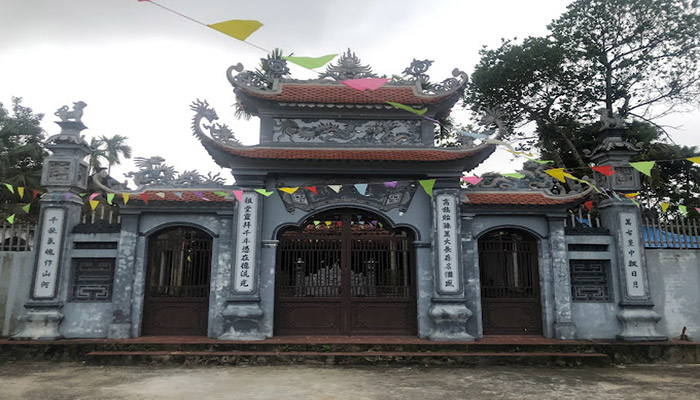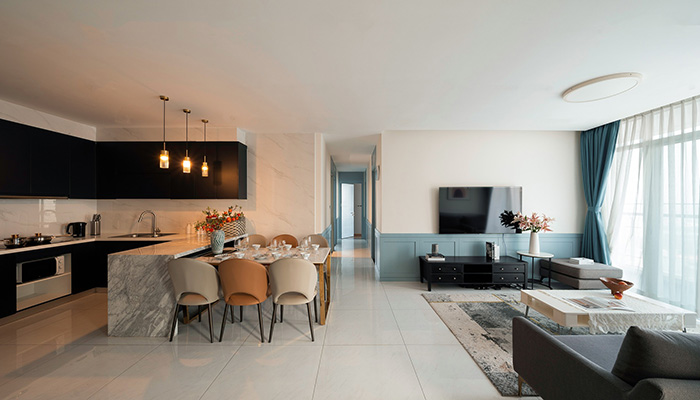The Unique Ancestral Hall of Marquis Luong Tran Nhu Lan
In Ha Nam - a land rich in historical traditions - ancient cultural relics not only tell stories of national heroes but also reflect generations of reverence for learning, loyalty, and patriotism. Among the more than 230 recognized heritage sites in the province, ancestral halls - places of worship for family lineages - hold a special place, preserving the legacy of scholars and military talents who helped shape Vietnam’s history. The ancestral hall of Marquis Luong Tran Nhu Lan, located in Ngoc Lu commune, Binh Luc district, is one such remarkable relic. With its ancient architecture, valuable artifacts, and the legacy of an extraordinary general of the Le dynasty, it stands as a lasting monument to time.
Majestic, Timeless Architecture in the Heart of Ha Nam

Built in the 17th century, the ancestral hall of Tran Nhu Lan retains the grandeur of traditional Vietnamese architecture. The structure includes five compartments made from ironwood, with robust wooden trusses supported by green stone foundations - ensuring durability through the ages. The doors, also made of ironwood, can be removed and reassembled with ease. Both gables are carved with tiger face motifs, a symbol of martial power in Vietnamese military tradition. Two large stone pillars in front of the courtyard enhance the hall’s imposing aura, symbolizing the high status of the Tran Nhu family throughout history.
Inside, the worship space exudes solemnity, with grand calligraphy panels and gilded couplets reflecting the deep reverence descendants hold for their ancestors. Every architectural detail and intricate carving showcases the craftsmanship of ancient artisans, contributing to the hall’s spiritual and artistic value.
Historical Treasures – Royal Decrees for a Prestigious Lineage
Among the most treasured elements of the hall are 15 imperial decrees from the Later Le dynasty - a priceless archive that documents the Tran Nhu family’s contributions to the court. Ten of these decrees were granted in the 17th century, and five more in 1769, honoring outstanding descendants of Marquis Luong Tran Nhu Lan.
.jpg)
What makes these decrees unique is that each honoree received them during their lifetime - a rare and significant recognition of the family's merit. Among Ha Nam’s heritage sites, few preserve such a large and diverse collection of Le dynasty royal decrees. These documents not only belong to the family’s legacy but also serve as critical sources for military and political history research.
Symbol of Martial Glory – Swords That Tell a Story
The ancestral hall leaves a lasting impression through both its royal decrees and its unique altar design. The ancestor tablets are shaped like upright swords, a powerful symbol of martial valor and the family’s proud military tradition.
The sword hilts are engraved with dragons facing the sun, symbolizing authority and prosperity, evoking strength and prestige. The sword guards are masterfully carved into images of two dragons curling in harmony - melding artistic beauty with symbolic strength. Each detail goes beyond aesthetics; it represents the spirit, ideals, and legacy of a noble lineage.
The Story of a Hero – From Humble Origins to National Glory
Tran Nhu Lan was born in 1563 into a poor family in Kim Lu village, now Ngoc Lu commune, Binh Luc district. Orphaned at a young age, he worked hard to support his family.
Despite his circumstances, he showed unwavering determination. While earning a living in the capital as a water carrier, he secretly trained in martial arts. His fate changed when he participated in an archery contest held by the court. His exceptional archery, swordsmanship, and horsemanship soon caught the attention of the Le dynasty.
During the war between the Le and Mac dynasties, he achieved great military victories, helping stabilize the nation. He and his five sons all became notable generals, building a lineage renowned in Vietnam’s military history. Family records show that within just a few generations, the Tran Nhu family produced 4 Marquises and 13 Lords - a rare feat for any Vietnamese noble family.
A Lasting Legacy – Contributions to the Homeland
As a trusted military leader of the Le court, Tran Nhu Lan also devoted himself to developing his homeland. Motivated by the people’s welfare, he and his family funded the restoration of communal houses and pagodas, built markets, roads, bridges, and docks - gradually improving local infrastructure to facilitate trade and daily life.
His vision extended to agriculture: he reorganized farmlands, reclaimed unused lands, and supported poor farmers, laying a foundation for sustainable agricultural development. His practical efforts transformed the local landscape and improved people’s lives.
Such was his impact that he was honored as a living deity (phúc thần) by locals while still alive - a rare and prestigious recognition. After his death, he was worshipped at the village communal house, symbolizing his unwavering loyalty and lifelong service to the people and the country.
To this day, many of the projects he initiated still stand - not only as physical structures but as living symbols of his foresight, compassion, and dedication to his homeland.
Ancestral Hall of Tran Nhu Lan – A Timeless Cultural Heritage
Standing tall in a land of deep-rooted traditions, the ancestral hall of Marquis Luong Tran Nhu Lan captivates visitors with its grand architecture, rare decrees, and priceless historical materials. More than just a place of worship, the hall is a “living museum”, preserving and narrating a legacy of scholarship, martial excellence, and patriotism passed down through generations of the Tran Nhu family.
Since being recognized as a National Historic Site in 1995, the ancestral hall has drawn attention from scholars and visitors alike. Every step within its ancient walls feels like a journey back in time - rekindling the spirit of Vietnam’s heroic past and gratitude for those who built the nation.
Exploring this site offers not just historical knowledge but also a deep sense of pride - pride in a cultural lineage that continues to shape the identity of the Vietnamese people. In the peaceful, solemn setting, every architectural line and artifact seems to whisper tales of resilience, loyalty, and honor.

Located in Binh Luc district, just 30 minutes by car from Tien Loc Palace Hotel, the ancestral hall of Tran Nhu Lan is a perfect stop for anyone visiting Ha Nam. Its convenient location allows visitors to combine visits to other iconic landmarks like Tam Chuc Pagoda or Tran Thuong Temple for a complete cultural journey. Whether you’re seeking relaxation or exploring Vietnam’s heritage, the hall’s quiet atmosphere, unique architecture, and deep historical significance promise a meaningful experience.
Visit the ancestral hall of Marquis Luong Tran Nhu Lan to feel the spirit of the Tran dynasty, hear the story of a national hero, and discover a sacred place where the soul of Vietnam is beautifully preserved.
Ha Nam awaits you!
Majestic, Timeless Architecture in the Heart of Ha Nam

Built in the 17th century, the ancestral hall of Tran Nhu Lan retains the grandeur of traditional Vietnamese architecture. The structure includes five compartments made from ironwood, with robust wooden trusses supported by green stone foundations - ensuring durability through the ages. The doors, also made of ironwood, can be removed and reassembled with ease. Both gables are carved with tiger face motifs, a symbol of martial power in Vietnamese military tradition. Two large stone pillars in front of the courtyard enhance the hall’s imposing aura, symbolizing the high status of the Tran Nhu family throughout history.
Inside, the worship space exudes solemnity, with grand calligraphy panels and gilded couplets reflecting the deep reverence descendants hold for their ancestors. Every architectural detail and intricate carving showcases the craftsmanship of ancient artisans, contributing to the hall’s spiritual and artistic value.
Historical Treasures – Royal Decrees for a Prestigious Lineage
Among the most treasured elements of the hall are 15 imperial decrees from the Later Le dynasty - a priceless archive that documents the Tran Nhu family’s contributions to the court. Ten of these decrees were granted in the 17th century, and five more in 1769, honoring outstanding descendants of Marquis Luong Tran Nhu Lan.
.jpg)
What makes these decrees unique is that each honoree received them during their lifetime - a rare and significant recognition of the family's merit. Among Ha Nam’s heritage sites, few preserve such a large and diverse collection of Le dynasty royal decrees. These documents not only belong to the family’s legacy but also serve as critical sources for military and political history research.
Symbol of Martial Glory – Swords That Tell a Story
The ancestral hall leaves a lasting impression through both its royal decrees and its unique altar design. The ancestor tablets are shaped like upright swords, a powerful symbol of martial valor and the family’s proud military tradition.
The sword hilts are engraved with dragons facing the sun, symbolizing authority and prosperity, evoking strength and prestige. The sword guards are masterfully carved into images of two dragons curling in harmony - melding artistic beauty with symbolic strength. Each detail goes beyond aesthetics; it represents the spirit, ideals, and legacy of a noble lineage.
The Story of a Hero – From Humble Origins to National Glory
Tran Nhu Lan was born in 1563 into a poor family in Kim Lu village, now Ngoc Lu commune, Binh Luc district. Orphaned at a young age, he worked hard to support his family.
Despite his circumstances, he showed unwavering determination. While earning a living in the capital as a water carrier, he secretly trained in martial arts. His fate changed when he participated in an archery contest held by the court. His exceptional archery, swordsmanship, and horsemanship soon caught the attention of the Le dynasty.
During the war between the Le and Mac dynasties, he achieved great military victories, helping stabilize the nation. He and his five sons all became notable generals, building a lineage renowned in Vietnam’s military history. Family records show that within just a few generations, the Tran Nhu family produced 4 Marquises and 13 Lords - a rare feat for any Vietnamese noble family.
A Lasting Legacy – Contributions to the Homeland
As a trusted military leader of the Le court, Tran Nhu Lan also devoted himself to developing his homeland. Motivated by the people’s welfare, he and his family funded the restoration of communal houses and pagodas, built markets, roads, bridges, and docks - gradually improving local infrastructure to facilitate trade and daily life.
His vision extended to agriculture: he reorganized farmlands, reclaimed unused lands, and supported poor farmers, laying a foundation for sustainable agricultural development. His practical efforts transformed the local landscape and improved people’s lives.
Such was his impact that he was honored as a living deity (phúc thần) by locals while still alive - a rare and prestigious recognition. After his death, he was worshipped at the village communal house, symbolizing his unwavering loyalty and lifelong service to the people and the country.
To this day, many of the projects he initiated still stand - not only as physical structures but as living symbols of his foresight, compassion, and dedication to his homeland.
Ancestral Hall of Tran Nhu Lan – A Timeless Cultural Heritage
Standing tall in a land of deep-rooted traditions, the ancestral hall of Marquis Luong Tran Nhu Lan captivates visitors with its grand architecture, rare decrees, and priceless historical materials. More than just a place of worship, the hall is a “living museum”, preserving and narrating a legacy of scholarship, martial excellence, and patriotism passed down through generations of the Tran Nhu family.
Since being recognized as a National Historic Site in 1995, the ancestral hall has drawn attention from scholars and visitors alike. Every step within its ancient walls feels like a journey back in time - rekindling the spirit of Vietnam’s heroic past and gratitude for those who built the nation.
Exploring this site offers not just historical knowledge but also a deep sense of pride - pride in a cultural lineage that continues to shape the identity of the Vietnamese people. In the peaceful, solemn setting, every architectural line and artifact seems to whisper tales of resilience, loyalty, and honor.

Located in Binh Luc district, just 30 minutes by car from Tien Loc Palace Hotel, the ancestral hall of Tran Nhu Lan is a perfect stop for anyone visiting Ha Nam. Its convenient location allows visitors to combine visits to other iconic landmarks like Tam Chuc Pagoda or Tran Thuong Temple for a complete cultural journey. Whether you’re seeking relaxation or exploring Vietnam’s heritage, the hall’s quiet atmosphere, unique architecture, and deep historical significance promise a meaningful experience.
Visit the ancestral hall of Marquis Luong Tran Nhu Lan to feel the spirit of the Tran dynasty, hear the story of a national hero, and discover a sacred place where the soul of Vietnam is beautifully preserved.
Ha Nam awaits you!

.jpg)








